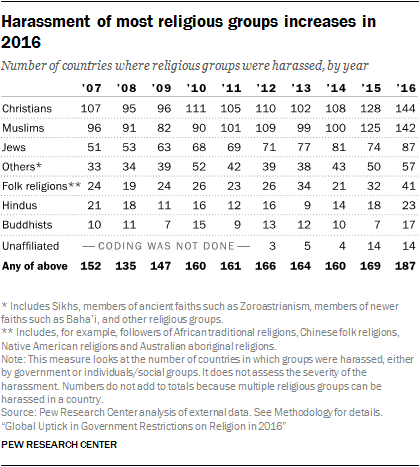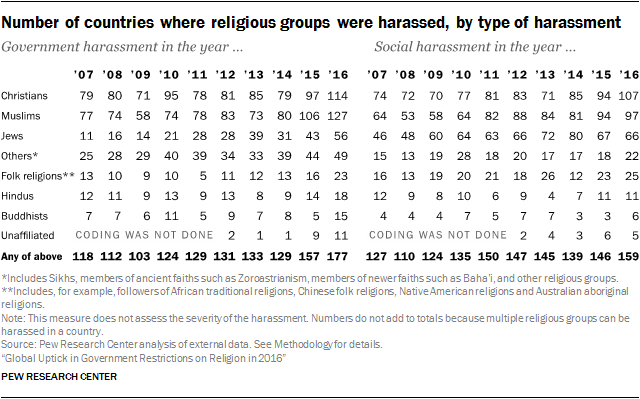
The analysis of 2016 sources found reports of religiously motivated harassment – whether perpetrated by governments or social groups – in the vast majority of the world’s countries (187, up from 169 in 2015). This marks the biggest number of countries where harassment was observed against religious groups since Pew Research Center began analyzing restrictions on religion in 2007.
Harassment of members of religious groups takes many forms, including physical assaults, arrests and detentions, desecration of holy sites, and discrimination against religious groups in employment, education and housing. Harassment and intimidation also include things like verbal assaults on members of one religious group by other groups or individuals.
Christians and Muslims have typically been harassed in the largest number of countries around the world. These two groups are the largest religious groups in the world and have substantial populations in more countries than other smaller and less geographically dispersed religious groups.
In 2016, Christians were harassed in 144 countries, up from 128 countries the year before. In Fiji, for example, the Methodist Church was criticized by the prime minister for allowing opposition political leaders to act as lay preachers.48 Likewise, Muslims were harassed in an increased number of countries in 2016 (142, up from 125), including in 41 out of 45 European countries. In Switzerland, a canton’s ban on burqas, niqabs and other face coverings in public entered into force, and on July 1, police detained a Muslim woman for wearing a niqab.49
Jews continued to be harassed in the third-largest number of countries, which is particularly notable due to their small population size (Jewish people make up just 0.2% of the world’s population). In 2016, the number of countries where Jews were harassed increased to 87, reversing the decline that occurred in 2015. In Uruguay, for example, a Jewish man was stabbed to death by an assailant claiming to follow Allah’s orders, and Jewish organizations said anti-Semitic attitudes were still present in parts of Uruguayan society.50
Hindus and Buddhists both saw increases in the number of countries where they were harassed in 2016. Hindus were harassed in 23 countries (up from 18 in 2015), while Buddhists were harassed in 17 countries (up from seven). These are both the highest figures since coding began in 2007. In Indonesia, 12 Buddhist temples were looted or burned down by a mob after a Buddhist woman asked a mosque to lower its loudspeaker volume.51
Religiously unaffiliated people – including atheists, agnostics and those who do not identify with any religion – were harassed in 14 countries in 2016, the same number as in 2015. In some of these cases, the religiously unaffiliated were prosecuted under the country’s blasphemy laws. In Russia, for example, an atheist blogger was charged under the blasphemy law for comments on his blog denying the existence of God and for describing the Bible as “a collection of Jewish fairy tales.”52
Government versus social harassment of groups
Not all religious groups are targeted equally by governments and social groups. At times, a group may be the victim of government harassment while not facing any harassment by social groups, or vice versa. For example, since 2007, Jews have consistently been harassed by social groups or individuals in more countries than they have been harassed by governments (66 vs. 56 in 2016). Christians, on the other hand, are harassed in more countries by governments (114 countries) than by social groups (107 countries). In Singapore, for example, the government has maintained a ban on Jehovah’s Witnesses since 1972, because the group objects to national service, reciting the national pledge or singing the national anthem. The government views these objections as running counter to public order and welfare. While Jehovah’s Witnesses generally are allowed to worship and practice their faith in private, they are not allowed to hold public meetings or publish their literature.53
Members of world religions other than the groups analyzed in this report were harassed by governments in 49 countries, and by social groups or individuals in 22 countries around the world. Some of these groups, which include (but are not limited to) Sikhs, Zoroastrians, Scientologists, Baha’i and Rastafarians, are banned in certain countries; for example, Baha’i are banned in Brunei.54 And in Pakistan, Sikh leaders reported that Sikh women had difficulty obtaining inheritances, accessing health services or voting due to legal uncertainties around registering marriages for Sikhs. 55
Christians were most likely to face harassment in the Asia-Pacific region, whether from government forces or social groups. Three-in-ten countries where Christians were harassed by governments were in the Asia-Pacific region, while a similar share – 27% – of countries where they were harassed by social groups were also located in the region. In Uzbekistan, for example, authorities raided the private homes of Protestant Christians, seized religious literature and imposed fines.56 And in Nepal, local communities in the Kathmandu Valley opposed burials by perceived “outsiders,” making it difficult for Protestant churches to access land they had bought years earlier.57
Muslims, on the other hand, were most likely to face harassment by both governments and social groups in Europe. Of the countries where Muslims were harassed by governments, 28% were in Europe, while an even bigger share of the countries where Muslims were harassed by social groups (35 of 97, or 36%) were in Europe. In Estonia and Lithuania, for example, local media and nongovernmental organizations reported more incidents involving anti-Muslim sentiments in 2016 than the previous year.58
